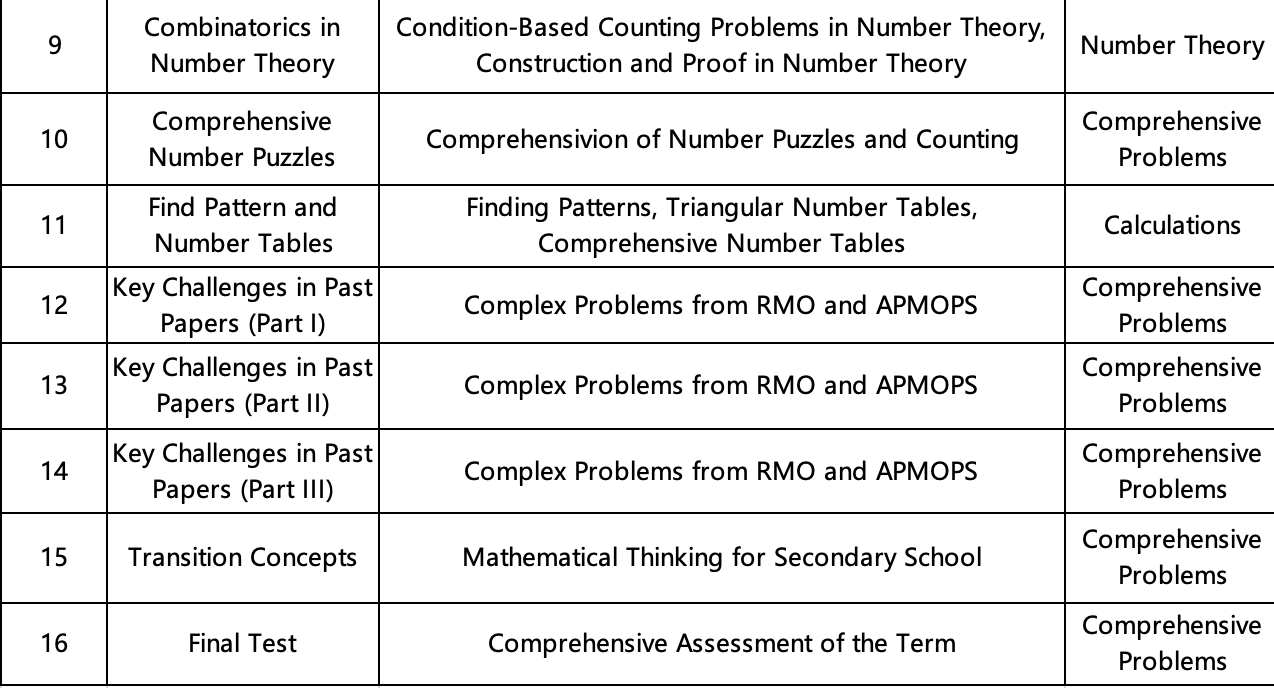|
Must-Read: What Will Kangaroo’s Term 1 P6 Students Learn? After the very first lesson, I noticed that the Tr. Gao Xuming and Tr. Smith were sharing feedback from parents and students in the teaching group chat. So, where do all these positive reviews come from? Let’s follow my lens as we take a closer look at the classrooms of Tr. Gao Xuming and Tr. Smith to see what the students learned in their first P6 lesson! A Peek Into the First Lesson: What’s the Course Design? At the start, Tr. Gao introduced the students to two key P6 competitions, RMO and APMOPS, both of which will be held in April (RMO on April 10 and APMOPS on April 17). With only three months left, this is a crucial preparation period. Students must seize this golden time to thoroughly prepare. Images sourced from RMO and APMOPS official websites
、

Then, he introduced the syllabus and topics for Term 1, which focus on: 1. Systematic Review of the Seven Major Modules Building on the holiday classes from the end of 2024, the first 11 lessons will systematically review the seven modules of primary school math. 2. Targeted Problem-Solving for RMO and APMOPS Lessons 12-14 will focus on high-frequency and challenging topics from these competitions. 3. Introduction to Core Mathematical Thinking The final lesson will emphasize critical mathematical concepts to help students transition smoothly into secondary school math. 4. Comprehensive Preparation Activities Additional support includes self-assessment booklets on key topics, past paper reviews, mock exams, pre-competition intensives, and open classes to help students prepare thoroughly. Inside the Classroom: Teaching in Action In the first lesson, students tackled 6-8 questions focused on the fractions and ratio module. The class began with a practical example of ratios in daily life, leading into the key concept of identifying the constant to unify quantities. Teachers guided students through classic and past competition questions from RMO and APMOPS, providing a systematic review of the module. Why Design the Curriculum This Way? Tr. Gao shared the P6 program’s core approach: 1. Modular, Systematic Review Starting from the holiday classes, students review the seven key modules—arithmetic, combinatorics, number theory, word problems, miscellaneous questions, and motion problems. Lessons fully cover all knowledge points tested in RMO and APMOPS. Every question on the 2024 RMO and APMOPS exams aligns with the content taught in these lessons. 2. Past Paper Integration Each module includes selected classic past competition questions. Teachers also design new, advanced questions to build a comprehensive understanding and prepare students for the flexible and varied nature of these competitions. 3. Focus on Knowledge and Thinking Challenging questions in RMO and APMOPS often assess mathematical thinking, such as reversing the problem, extreme cases, or starting simple. Lessons emphasize these principles, helping students understand the underlying logic and characteristics of such questions. How Do Students Learn So Much in Term 1? The answer lies in Kangaroo.Study’s three teaching philosophies: 1. Guiding, Not Pushing Teachers never directly give answers. Instead, they guide students to think independently, step by step, helping them discover solutions and understand the logic behind each question. 2. No Understanding, No Leaving Students cannot leave the classroom without understanding every topic or question. Teachers patiently explain until they fully grasp the concepts. 3. Building a Sense of Achievement Teachers encourage students to ask questions without fear of judgment, fostering confidence and a genuine interest in math through positive reinforcement.
To handle the extensive knowledge covered, after-class consolidation is also crucial: • Pre-class and post-class Quiz: Pre-tests review previous knowledge, while post-tests assess understanding of the day’s content. Students must complete tests with 100% accuracy before leaving. • Homework assignments: Students receive structured exercises and are required to redo incorrect answers. These tasks not only strengthen knowledge but also build effective learning and revision habits. End of the First Lesson: What’s Next?
By the end of the first lesson, some students left full of confidence, while others stayed behind to ask teachers about challenging problems. When asked about the ultimate learning goals for this term, Tr. Gao said: The goal of the P6 MO program is to systematically review and identify gaps in knowledge, establish a complete knowledge system across seven major modules, and help students summarize various question types and problem-solving techniques. The program also aims to enhance students’ critical thinking and problem-solving abilities while exposing them to high-level questions from major international and local competitions. These efforts prepare them to tackle the wide scope and high difficulty of the RMO and APMOPS, striving for second-round qualifications, HD awards, and even Platinum achievements. Conclusion: Looking Forward to a New Semester! The first lesson has successfully concluded. From initial nervousness to gradually adapting and even enjoying problem-solving, how has your child benefited? Share your thoughts in the comments!
Start Date: January 11, 2025 (once weekly) Class Format: In-person Location: #02-12, Grantral Mall, 601 MacPherson Road, 368242 Class Size: Maximum of 16 students Fees: $120 per lesson. Term 1 includes 16 lessons, totaling $1,920 (no registration fee, no deposit, no material fee, and refunds available anytime).
Spots are limited—contact Tr. Gao Xuming to sign up!
|